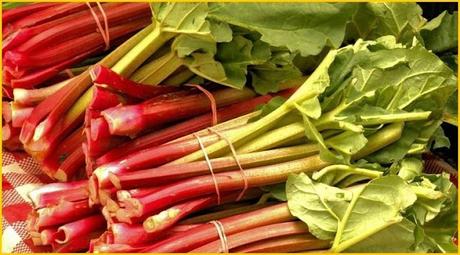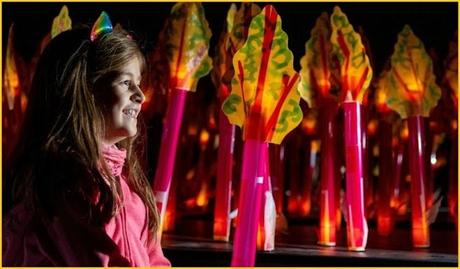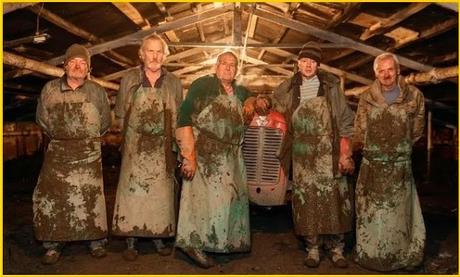
freshly strangulated 'forced' rhubarb (PDO)
Why Yorkshire? It's actually not even the whole county, but a small area of about 23 km2 in West Yorkshire between Wakefield, Morley and Rothwell, famously known as 'the rhubarb triangle', but more significantly referenced colloquially as 'the frosty pocket', wherein conditions are not dissimilar from the chilly Mongolian steppeland in which this strain of the plant originated. Rhubarb has thrived in the triangle's wet and frosty environment (with plentiful fertiliser in the form of 'night soil' from the nearby conurbations) since the 1800s.To grow it in the quantities required to meet demand (not just in the UK but on the continent, prior to Brexit), Yorkshire rhubarb is 'forced'. Rhubarb plants spend a couple of happy years out in the fields without being harvested, soaking up sunlight which they store in their roots as carbohydrates. The roots are then subjected to November's sharp frosts before being moved indoors into sheds where they are kept in warm but completely dark conditions. Such an environment encourages them to continue growing and they convert the carbohydrates stored in their roots into glucose, resulting in tender stalks with the sour-sweet flavor for which forced rhubarb is known. When ready, the rhubarb is harvested by candlelight. At one time, during the season (December through to March) there would be a special nightly rhubarb train running from Ardley station to London to supply Covent Garden with the precious crop. Nowadays the supply chain is more varied and road-based. In 2010 Yorkshire Forced Rhubarb from the triangle was granted Protected Designation of Origin status (PDO) by the European Commission's Protected Food Name scheme. And then the weirdness begins...

high-priestess Rhuby
Every February, the city of Wakefield holds its Rhubarb Festival, presided over by a high-priestess, three days of peace and music - no, sorry, that was Woodstock - three days in which the good citizens of the frosty pocket paint the town metaphorically rhubarby, with a large food and drink market extolling and selling local produce (including lots of rhubarb-related goodies), frequent cookery demonstrations (101 things to do with rhubarb), a rhubarb trail through the city, gardening and foraging workshops, arts and craft tents. sales of illuminated rhubarb stalks to light the up evening, lively street entertainments and of course demonstrations of how to strangulate rhubarb by candlelight, provided by a crack squad of ruthless rhubarbarian night harvesters.
ruthless rhubarbarian night harvesters
Here I should probably pause, and concede that I got a bit carried away with the high-priestess thing and that reference to demonstrations of rhubarb strangulation - though the photographs do not lie, and there is music.In conclusion, unlike Yorkshire Tea - which patently isn't grown in Yorkshire but is imported from Africa and Asia - Yorkshire Forced Rhubarb (PDO) is the proper job, the real McCoy, the dog's bollocks. Accept no substitute.
Rhubarbers(poem to follow asap - being forced)

Thanks for reading, S ;-) Email ThisBlogThis!Share to TwitterShare to Facebook
